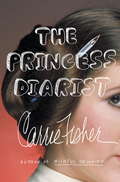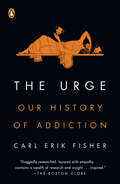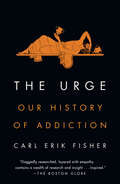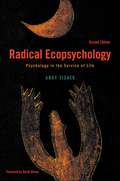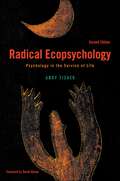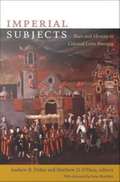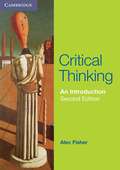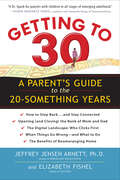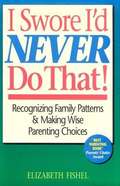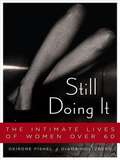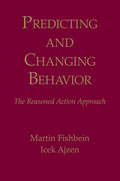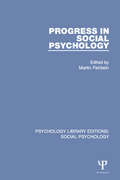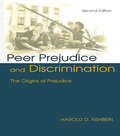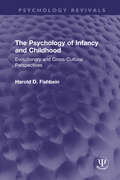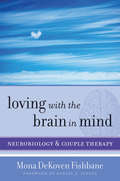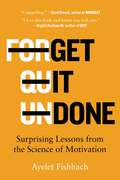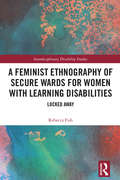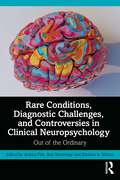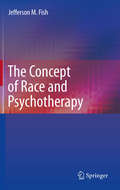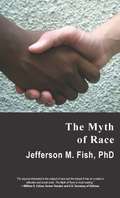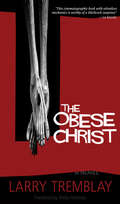- Table View
- List View
The Princess Diarist
by Carrie Fisher<P>The Princess Diarist is Carrie Fisher's intimate, hilarious and revealing recollection of what happened behind the scenes on one of the most famous film sets of all time, the first Star Wars movie. Named a PEOPLE Magazine Best Book of Fall 2016. <P>When Carrie Fisher recently discovered the journals she kept during the filming of the first Star Wars movie, she was astonished to see what they had preserved--plaintive love poems, unbridled musings with youthful naiveté, and a vulnerability that she barely recognized. Today, her fame as an author, actress, and pop-culture icon is indisputable, but in 1977, Carrie Fisher was just a teenager with an all-consuming crush on her costar, Harrison Ford. <P>With these excerpts from her handwritten notebooks, The Princess Diarist is Fisher's intimate and revealing recollection of what happened on one of the most famous film sets of all time--and what developed behind the scenes. And today, as she reprises her most iconic role for the latest Star Wars trilogy, Fisher also ponders the joys and insanity of celebrity, and the absurdity of a life spawned by Hollywood royalty, only to be surpassed by her own outer-space royalty. <P>Laugh-out-loud hilarious and endlessly quotable, The Princess Diarist brims with the candor and introspection of a diary while offering shrewd insight into the type of stardom that few will ever experience. <P><b>A New York Times Bestseller</b>
The Urge: Our History of Addiction
by Carl Erik FisherAn authoritative, illuminating, and deeply humane history of addiction—a phenomenon that remains baffling and deeply misunderstood despite having touched countless lives—by an addiction psychiatrist striving to understand his own family and himself&“Carl Erik Fisher&’s The Urge is the best-written and most incisive book I&’ve read on the history of addiction. In the midst of an overdose crisis that grows worse by the hour and has vexed America for centuries, Fisher has given us the best prescription of all: understanding. He seamlessly blends a gripping historical narrative with memoir that doesn&’t self-aggrandize; the result is a full-throated argument against blaming people with substance use disorder. The Urge is a propulsive tour de force that is as healing as it is enjoyable to read.&”—Beth Macy, author of DopesickEven after a decades-long opioid overdose crisis, intense controversy still rages over the fundamental nature of addiction and the best way to treat it. With uncommon empathy and erudition, Carl Erik Fisher draws on his own experience as a clinician, researcher, and alcoholic in recovery as he traces the history of a phenomenon that, centuries on, we hardly appear closer to understanding—let alone addressing effectively. As a psychiatrist-in-training fresh from medical school, Fisher was soon face-to-face with his own addiction crisis, one that nearly cost him everything. Desperate to make sense of the condition that had plagued his family for generations, he turned to the history of addiction, learning that the current quagmire is only the latest iteration of a centuries-old story: humans have struggled to define, treat, and control addictive behavior for most of recorded history, including well before the advent of modern science and medicine. A rich, sweeping account that probes not only medicine and science but also literature, religion, philosophy, and public policy, The Urge illuminates the extent to which the story of addiction has persistently reflected broader questions of what it means to be human and care for one another. Fisher introduces us to the people who have endeavored to address this complex condition through the ages: physicians and politicians, activists and artists, researchers and writers, and of course the legions of people who have struggled with their own addictions. He also examines the treatments and strategies that have produced hope and relief for many people with addiction, himself included. Only by reckoning with our history of addiction, he argues—our successes and our failures—can we light the way forward for those whose lives remain threatened by its hold. The Urge is at once an eye-opening history of ideas, a riveting personal story of addiction and recovery, and a clinician&’s urgent call for a more expansive, nuanced, and compassionate view of one of society&’s most intractable challenges.
The Urge: Our History of Addiction
by Carl Erik FisherAn authoritative, illuminating, and deeply humane history of addiction—a phenomenon that remains baffling and deeply misunderstood despite having touched countless lives—by an addiction psychiatrist striving to understand his own family and himselfEven after a decades-long opioid overdose crisis, intense controversy still rages over the fundamental nature of addiction and the best way to treat it. With uncommon empathy and erudition, Carl Erik Fisher draws on his own experience as a clinician, researcher, and alcoholic in recovery as he traces the history of a phenomenon that, centuries on, we hardly appear closer to understanding—let alone addressing effectively. As a psychiatrist-in-training fresh from medical school, Fisher was soon face-to-face with his own addiction crisis, one that nearly cost him everything. Desperate to make sense of the condition that had plagued his family for generations, he turned to the history of addiction, learning that the current quagmire is only the latest iteration of a centuries-old story: humans have struggled to define, treat, and control addictive behavior for most of recorded history, including well before the advent of modern science and medicine. A rich, sweeping history that probes not only medicine and science but also literature, religion, philosophy, and sociology, The Urge illuminates the extent to which the story of addiction has persistently reflected broader questions of what it means to be human and care for one another. Fisher introduces us to the people who have endeavored to address this complex condition through the ages: physicians and politicians, activists and artists, researchers and writers, and of course the legions of people who have struggled with their own addictions. He also examines the treatments and strategies that have produced hope and relief for many people with addiction, himself included. Only by reckoning with our history of addiction, he argues—our successes and our failures—can we light the way forward for those whose lives remain threatened by its hold. The Urge is at once an eye-opening history of ideas, a riveting personal story of addiction and recovery, and a clinician&’s urgent call for a more expansive, nuanced, and compassionate view of one of society&’s most intractable challenges.
Radical Ecopsychology: Psychology in the Service of Life (2nd Edition) (SUNY series in Radical Social and Political Theory)
by Andy FisherA provocative look at the philosophical concepts (and conceits) that underlie what truly is a radical new form of social thought.
Radical Ecopsychology, Second Edition: Psychology in the Service of Life (SUNY series in Radical Social and Political Theory)
by Andy FisherPersonal in its style yet radical in its vision, Radical Ecopsychology, Second Edition offers an original introduction to ecopsychology—an emerging field that ties the human mind to the natural world. In order for ecopsychology to be a force for social change, Andy Fisher insists it must become a more comprehensive and critical undertaking. Drawing masterfully from humanistic psychology, hermeneutics, phenomenology, radical ecology, nature writing, and critical theory, he develops a compelling account of how the human psyche still belongs to nature. This daring and innovative book proposes a psychology that will serve all life, providing a solid base not only for ecopsychological practice, but also for a critical theory of modern society. In this second edition, Fisher includes a new preface, a new section looking back at the development of the field since the book's initial publication a decade ago, and a look at the challenges that lie ahead.
Imperial Subjects: Race and Identity in Colonial Latin America
by Andrew B. Fisher Matthew D. O'HaraIn colonial Latin America, social identity did not correlate neatly with fixed categories of race and ethnicity. As Imperial Subjects demonstrates, from the early years of Spanish and Portuguese rule, understandings of race and ethnicity were fluid. In this collection, historians offer nuanced interpretations of identity as they investigate how Iberian settlers, African slaves, Native Americans, and their multi-ethnic progeny understood who they were as individuals, as members of various communities, and as imperial subjects. The contributors' explorations of the relationship between colonial ideologies of difference and the identities historical actors presented span the entire colonial period and beyond: from early contact to the legacy of colonial identities in the new republics of the nineteenth century. The volume includes essays on the major colonial centers of Mexico, Peru, and Brazil, as well as the Caribbean basin and the imperial borderlands. Whether analyzing cases in which the Inquisition found that the individuals before it were "legally" Indians and thus exempt from prosecution, or considering late-eighteenth- and early-nineteenth-century petitions for declarations of whiteness that entitled the mixed-race recipients to the legal and social benefits enjoyed by whites, the book's contributors approach the question of identity by examining interactions between imperial subjects and colonial institutions. Colonial mandates, rulings, and legislation worked in conjunction with the exercise and negotiation of power between individual officials and an array of social actors engaged in countless brief interactions. Identities emerged out of the interplay between internalized understandings of self and group association and externalized social norms and categories. Contributors. Karen D. Caplan, R. Douglas Cope, Mariana L. R. Dantas, Mara Elena Daz, Andrew B. Fisher, Jane Mangan, Jeremy Ravi Mumford, Matthew D. O'Hara, Cynthia Radding, Sergio Serulnikov, Irene Silverblatt, David Tavrez, Ann Twinam
Critical Thinking: An Introduction (Second Edition)
by Alec FisherThis second edition has been extensively revised with updated examples and a brand new chapter on how to obtain reliable information from the internet. Studying critical thinking involves trying to change the ways in which most of us think. In this second edition of the popular 'Critical Thinking: An Introduction', Alec Fisher concentrates on developing critical thinking skills explicitly and directly. His aim is to teach the ability to interpret, analyse and evaluate ideas and arguments and to show how these skills can be transferred to other studies and everyday life. A new chapter covers getting reliable information from the internet and examples and passages have been replaced by completely new material. The book is also suitable for the independent learner.
Getting to 30: A Parent's Guide to the 20-Something Years
by Elizabeth Fishel Jeffrey Jensen Arnett“This is the book parents have been waiting for”—Michael Thompson, coauthor of Raising Cain. The book that is “helpful, hopeful, and engaging”—Jeanne Brooks-Gunn, Ph.D., Columbia University. It is the book that addresses the new reality for parents of kids in their 20s and the issues that everyone in the media is talking about: When will this new generation of 20-somethings leave home, find love, start a career, settle down—grow up? And it's the book that will soothe your nerves. It’s loaded with information about what to expect and guidance on what to do when problems arise (as they probably will). In other words, this is the book parents need—Getting to 30, by Jeffrey Jensen Arnett, the world's leading authority on the post-adolescent phase he named emerging adulthood, and Elizabeth Fishel, author of Sisters and other books. As Getting to 30 shows, the road to adulthood is longer than we think—and, for parents, bumpier. It explains what’s really happening to your 18- to 29-year-old, including the story behind your child’s moods. The phenomenon of the boomerang child—and why it’s actually a good thing, for parents and kids. The new landscape of 20-something romance. And it gives all the tools parents need to deal with the challenges, from six ways to listen more than you talk, to knowing when to open (and close) the Bank of Mom and Dad while saving for retirement, to figuring out the protocol for social media. Published in hardcover as When Will My Grown-Up Kid Grow Up?, Getting to 30 includes the latest research on the optimistic and supportive attitude most parents have regarding their 20-something children.
I Swore I'd Never Do That! Recognizing Family Patterns and Making Wise Parenting Choices
by Elizabeth FishelWhat parent hasn't felt the shock of recognition: I sound just like my parents! To our surprise, we often hear the past echoing through the choices we make as parents.
Still Doing It
by Deirdre Fishel Diana Holtzberg"An informed, honest, joyous book. Younger women may well envy us." -Suzanne Braun Levine, author of Inventing the Rest of Our Lives and "Sex, love, and life can grow even richer as we grow older, and the stereotype-busting women in this book show us scores of ways. These women are not going downhill, they're on a roll. They are women of juice and wisdom-and living proof that the best is yet to come."- Gina Ogden, PhD, author of Women Who Love Sex, The Heart and Soul of Sex, and The Return of Desire When Deirdre Fishel and Diana Holtzberg began work on their documentary Still Doing It, they knew they were catching a wave. The women of the baby-boom generation who had been so outspoken about sexuality and freedom were about to turn sixty, yet no one was talking about the revolution in aging. Nor was anyone letting on about the big dark secret that women born before the boomers, even way before, were a hell of a lot more vital than the images we were getting, and many were still having sex-and loving it! In Still Doing It, Fishel, Holtzberg, and the incredible women in their documentary broke the silence. Now they are back, with a stimulating and eye-opening book that offers a deeper look at women who break every stereotype we have about sex and intimacy. These women are dynamic, confident, opinionated, and wise. They're also having the kind of intense sexual experiences and fantasies we never associate with grandmothers. You'll meet Betty, who met her live-in boyfriend in an online chat room when she was sixty-nine and he was twenty-two; Joani, age seventy, who shares her boyfriend with another woman; and Frances, who encountered the intellectual and sexual love of her life at eighty. Today's women are living longer, healthier lives, and their appetite for sex and adventure isn't fading. Aware of their mortality, they understand just how precious life really is, and are willing to take risks to go after what they want. Challenging stereotypes about older women, Still Doing It lets everyone know that sex and adventure do not need to end when you hit sixty (or seventy . . . or ninety!). In fact, the good stuff is often just beginning.
Predicting and Changing Behavior: The Reasoned Action Approach
by Martin Fishbein Icek AjzenThis book describes the reasoned action approach, an integrative framework for the prediction and change of human social behavior. It provides an up-to-date review of relevant research, discusses critical issues related to the reasoned action framework, and provides methodological and conceptual tools for the prediction and explanation of social behavior and for designing behavior change interventions.
Progress in Social Psychology: Volume 1 (Psychology Library Editions: Social Psychology)
by Martin FishbeinOriginally published in 1980, this title was the first of a new monograph series in social psychology. The editor presents a format for showing the progress of social psychology as a viable, exciting and relevant discipline. <P><P>The papers contained in this volume represent progress in theory and method as well as in basic and applied research. In addition, recognising that not all social psychology is produced by people who label themselves as ‘social psychologists’ the volume contains the contributions of scholars who are best known for their work in other areas.
Peer Prejudice and Discrimination: The Origins of Prejudice
by Harold D. FishbeinThis award-winning book provides an analysis of the genetic/evolutionary, cultural/historical, and developmental aspects of prejudice and discrimination. It emphasizes how certain genetic/evolutionary mechanisms are utilized to both produce and prevent prejudice and discrimination from occurring or to modify these behaviors once established. The goals of the book are to help us understand the limitations of interventions and increase tolerance and acceptance of outsiders. Peer Prejudice and Discrimination, Second Edition is ideal for advanced-level courses on prejudice and/or discrimination taught in departments of psychology, education, and sociology, as well as a valuable addition to any serious scholars personal library.
The Psychology of Infancy and Childhood: Evolutionary and Cross-Cultural Perspectives (Psychology Revivals)
by Harold D. FishbeinOriginally published in 1984, this book is a developmental psychology text with substantial evolutionary and cross-cultural work. It presents cognitive developmental issues, as well as personality, social and socialization issues, with an emphasis on culture. It also includes education-related research, such as material on schools, reading, mathematics, and IQ.
Loving with the Brain in Mind: Neurobiology and Couple Therapy (Norton Series on Interpersonal Neurobiology)
by Mona Dekoven Fishbane Daniel J. SiegelFacilitating change in couple therapy by understanding how the brain works to maintain--and break--old habits. Human brains and behavior are shaped by genetic predispositions and early experience. But we are not doomed by our genes or our past. Neuroscientific discoveries of the last decade have provided an optimistic and revolutionary view of adult brain function: People can change. This revelation about neuroplasticity offers hope to therapists and to couples seeking to improve their relationship. Loving With the Brain in Mind explores ways to help couples become proactive in revitalizing their relationship. It offers an in-depth understanding of the heartbreaking dynamics in unhappy couples and the healthy dynamics of couples who are flourishing. Sharing her extensive clinical experience and an integrative perspective informed by neuroscience and relationship science, Mona Fishbane gives us insight into the neurobiology underlying couples' dances of reactivity. Readers will learn how partners become reactive and emotionally dysregulated with each other, and what is going on in their brains when they do. Clear and compelling discussions are included of the neurobiology of empathy and how empathy and selfregulation can be learned. Understanding neurobiology, explains Fishbane, can transform your clinical practice with couples and help you hone effective therapeutic interventions. This book aims to empower therapists-- and the couples they treat--as they work to change interpersonal dynamics that drive them apart. Understanding how the brain works can inform the therapist's theory of relationships, development, and change. And therapists can offer clients "neuroeducation" about their own reactivity and relationship distress and their potential for personal and relational growth. A gifted clinician and a particularly talented neuroscience writer, Dr. Fishbane presents complex material in an understandable and engaging manner. By anchoring her work in clinical cases, she never loses sight of the people behind the science.
Get It Done: Surprising Lessons from the Science of Motivation
by Ayelet FishbachDiscover a "compelling" framework for setting and achieving your goals (Carol Dweck, author of Mindset), from a psychologist on the cutting edge of motivational science. A great deal of ink has been spilled on the subject of motivating and influencing others, but what happens when the person you most want to influence is you? Setting and achieving goals for yourself—at work, at home, and in relationships—is harder than it seems. How do you know where to start? How do you carry on in the face of roadblocks and distractions? How do you decide which tasks and ambitions to prioritize when you&’re faced with more responsibilities, needs, and desires than you can keep track of? In Get It Done, psychologist and behavioral scientist Ayelet Fishbach presents a new theoretical framework for self-motivated action, explaining how to: Identify the right goalsAttack the &“middle problem&”Battle temptationsUse the help of others around youAnd so much more...With fascinating research from the field of motivation science and compelling stories of people who learned to motivate themselves, Get It Done illuminates invaluable strategies for pulling yourself in whatever direction you want to go—so you can achieve your goals while staying healthy, clearheaded, and happy.
A Feminist Ethnography of Secure Wards for Women with Learning Disabilities: Locked Away (Interdisciplinary Disability Studies)
by Rebecca FishWhat is life like for women with learning disabilities detained in a secure unit? This book presents a unique ethnographic study conducted in a contemporary institution in England. Rebecca Fish takes an interdisciplinary approach, drawing on both the social model of disability and intersectional feminist methodology, to explore the reasons why the women were placed in the unit, as well their experiences of day-to-day life as played out through relationships with staff and other residents. She raises important questions about the purpose of such units and the services they offer. Through making the women’s voices heard, this book presents their experiences and unique perspectives on topics such as seclusion, restraint, and resistance. Exploring how the ever present power disparity works to regulate women’s behaviour, the book shows how institutional responses replicate women’s bad experiences from the past, and how women’s responses are seen as pathological. It demonstrates that women are not passive recipients of care, but shape their own identity and futures, sometimes by resisting the norms expected of them (within allowed limits) and sometimes by transgressing the rules. These insights thus challenge traditional institutional accounts of gender, learning disability and deviance and highlight areas for reform in policy, practice, methodology, and social theory. This ground-breaking book will be of interest to scholars, students, policymakers and advocates working in the fields of learning disability and disability studies more widely, gender studies and sociology.
Rare Conditions, Diagnostic Challenges, and Controversies in Clinical Neuropsychology: Out of the Ordinary
by Jessica Fish Shai Betteridge Barbara A. WilsonThis book highlights those rare, difficult to diagnose or controversial cases in contemporary clinical neuropsychology. The evidence base relevant to this type of work is almost by definition insufficient to guide practice, but most clinicians will encounter such cases at some point in their careers. By documenting the experiences and learning of clinicians who have worked with cases that are ‘out of the ordinary’, the book addresses an important gap in the literature. The book discusses 23 challenging and fascinating cases that fall outside what can be considered routine practice. Divided into three sections, the text begins by addressing rare and unusual conditions, defined as either conditions with a low incidence, or cases with an atypical presentation of a condition. It goes on to examine circumstances where an accurate diagnosis and/or coherent case formulation has been difficult to reach. The final section addresses controversial conditions in neuropsychology, including those where there is ongoing scientific debate, disagreement between important stakeholders, or an associated high-stakes decision. This text covers practice across lifespan and offers crucial information on specific conditions as well as implications for practice in rare disorders. This book will be beneficial for clinical neuropsychologists and applied psychologists working with people with complex neurological conditions, along with individuals from medical, nursing, allied health and social work backgrounds. It will further be of appeal to educators, researchers and students of these professions and disciplines.
The Concept of Race and Psychotherapy
by Jefferson M. FishIs our society color-blind? Trans-racial? Post-racial? And what--if anything--should this mean to professionals in clinical practice with diverse clients? The ambitious volume The Concept of Race and Psychotherapy probes these questions, compelling readers to look differently at their clients (and themselves), and offering a practical framework for more effective therapy. By tracing the racial "folk taxonomies" of eight cultures in the Americas and the Caribbean, the author elegantly defines race as a fluid construct, dependent on local social, political, and historical context for meaning but meaningless in the face of science. This innovative perspective informs the rest of the book, which addresses commonly held assumptions about problem behavior and the desire to change, and presents a social-science-based therapy model, applicable to a wide range of current approaches, that emphasizes both cultural patterns and client uniqueness. Among the highlights of the coverage: Common elements in therapy and healing across cultures.The psychological appeal of racial concepts despite scientific evidence to the contrary.Lessons psychology can learn from anthropology.Three types of therapeutic relationships, with strategies for working effectively in each.The phenomenon of discontinuous change in brief therapy.Solution-focused therapy from a cross-cultural perspective. Thought-provoking reading for psychologists, psychiatrists, clinical social workers, and other mental health professionals as well as graduate students in these fields, The Concept of Race and Psychotherapy affirms the individuality--and the interconnectedness--of every client.
The Myth of Race
by Jefferson M. FishThe Myth of Race deals concisely with a wide range of topics, from how the concept of race differs in different cultures and race relations in the United States, to IQ tests and the census. It draws on scientific knowledge to topple a series of myths that pass as facts, correct false assumptions, and clarify cultural misunderstandings about the highly charged topic of race.The book demonstrates that the apparently straightforward concept of race is actually a confused mixture of two different concepts; and the confusion often leads to miscommunication. The first concept, biological race, simply doesn't exist in the human species. Instead, what exists is gradual variation in what people look like (e.g., skin color and facial features) and in their genes, as you travel around the planet--with more distant populations appearing more different than closer ones. If you travel in different directions, the populations look different in different ways. The second concept, social race, is a set of cultural categories for labeling people based on how their ancestors were classified, selected aspects of what they look like, or various combinations of both. These sets of categories vary widely from one culture to another.
Art-Based Supervision: Cultivating Therapeutic Insight Through Imagery
by Barbara J. FishArt-Based Supervision is a unique text for graduate supervision classes and seminars as well as a resource for post-graduate supervisors and practitioners. It offers a new view of supervision, one that incorporates both images and words as tools to investigate and communicate the interactions that occur in therapy and in the systems in which clinicians work. The fundamental principles of supervision provided in the book are useful for anyone interested in exploring the use of images to support reflection, understanding, and empathy in their work. Full-color images further enrich the narrative. In addition to supervision courses, Art-based Supervision may be used for introductory art therapy, psychology, social work, and counseling courses for readers interested in a broad range of intimate examples of the challenges of therapeutic work and the use of response art to grasp nuanced communication.
Franz Brentano and Austrian Philosophy (Vienna Circle Institute Yearbook #24)
by Denis Fisette Guillaume Fréchette Friedrich StadlerThe book discusses Franz Brentano’s impact on Austrian philosophy. It contains both a critical reassessment of Brentano’s place in the development of Austrian philosophy at the turn of the 20th century and a reevaluation of the impact and significance of his philosophy of mind or ‘descriptive psychology’ which was Brentano's most important contribution to contemporary philosophy and to the philosophy in Vienna. In addition, the relation between Brentano, phenomenology, and the Vienna Circle is investigated, together with a related documentation of Brentano's disciple Alfred Kastil (in German). The general part deals with the ongoing discussion of Carnap's "Aufbau" (Vienna Circle Lecture by Alan Chalmers) and the philosophy of mind, with a focus on physicalism as discussed by Carnap and Wittgenstein (Gergely Ambrus). As usual, two reviews of recent publications in the philosophy of mathematics (Paolo Mancosu) and research on Otto Neurath's lifework (Jordi Cat/Adam Tuboly) are included as related research contributions. This book is of interest to students, historians, and philosophers dealing with the history of Austrian and German philosophy in the 19th and 20th century.
The Obese Christ
by Sheila Fischman Larry TremblayThe asocial, sexually repressed Edgar, kneeling in grief at his mother's graveside, turns abruptly to witness a terrifying and life-altering event: the brutal rape of a young woman. Compelled by muddled instinct (and ingrained religious conviction), our hero bears the unconscious victim home, solemnly pledging to care for her - and to act as her saviour. As winter closes in, the captor's neuroses are revealed and his behaviour becomes increasingly violent, allowing the victim only one escape.With The Obese Christ, Larry Tremblay squarely situates himself within the realm of Hitchcock, Polanski, and Stephen King. A brilliant exercise in unease and paranoia, The Obese Christ demonstrates Tremblay's powerful ability to evoke dead and fear, while immersing the reader in a wrapped and putrid world told from Edgar's sanctified point of view.
Vocational Impact of Psychiatric Disorders: A Guide for Rehabilitation Professionals
by Gary L. FischlerA guide for rehabilitation professionals.
Praxiswissen Wirtschaftsmediation: Strategien, Modelle und Methoden für Unternehmen
by Christa Fischer-Korp Bernhard Wisleitner Ilse Ennsfellner Margit Ehardt-Schmiederer Claudia Pöschl Michael HambergerDieses Buch bietet einen Überblick über Anwendungsmöglichkeiten der Wirtschaftsmediation und mediativer Dienstleistungen. Praktische Beispiele präsentieren Strategien, mediative Modelle und Methoden für konkrete Lösungswege. Die Buchbeiträge bieten Wirtschaftstreibenden verständliche Einblicke und sprachlich bebilderte Ausblicke – quer durch bunte Landschaften betrieblicher Herausforderungen. Die AutorInnen sind ExpertInnen der Wirtschaftsmediation und bündeln ihr breites Wissen und ihre vielfältigen Erfahrungen. Von Interesse ist das Buch für UnternehmerInnen, Führungskräfte und MitarbeiterInnen - also all jene, die aus den mediativen Dienstleistungen einen Mehrwert für sich und ihr Unternehmen oder ihr Arbeitsumfeld schöpfen möchten.
